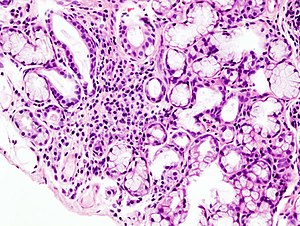
Sjogrens syndrome

Sjögren syndrome (SjS, SS) is a long-term autoimmune disease that affects the body's moisture-producing glands. Primary symptoms are a dry mouth and dry eyes. Other symptoms can include dry skin, vaginal dryness, a chronic cough, numbness in the arms and legs, feeling tired, muscle and joint pains, and thyroid problems. Those affected are at an increased risk (5%) of lymphoma. Sjögren syndrome (SjS, SS) is a long-term autoimmune disease that affects the body's moisture-producing glands. Primary symptoms are a dry mouth and dry eyes. Other symptoms can include dry skin, vaginal dryness, a chronic cough, numbness in the arms and legs, feeling tired, muscle and joint pains, and thyroid problems. Those affected are at an increased risk (5%) of lymphoma. While the exact cause is unclear, it is believed to involve a combination of genetics and an environmental trigger such as exposure to a virus or bacteria. It can occur independently of other health problems (primary Sjögren syndrome) or as a result of another connective tissue disorder (secondary Sjögren syndrome). The inflammation that results progressively damages the glands. Diagnosis is by biopsy of moisture-producing glands and blood tests looking for specific antibodies. On biopsy there are typically lymphocytes within the glands. Treatment is directed at the person's symptoms. For dry eyes artificial tears, medications to reduce inflammation, punctal plugs, or surgery to shut the tear ducts, may be tried. For a dry mouth, chewing gum (preferably sugar free), sipping water, or a saliva substitute may be used. In those with joint or muscle pain, ibuprofen may be used. Medications that can cause dryness, such as antihistamines, may also be stopped. The disease was described in 1933 by Henrik Sjögren, after whom it is named; however, a number of earlier descriptions of people with the symptoms exist. Between 0.2% and 1.2% of the population are affected, with half having the primary form and half the secondary form. Females are affected about ten times as often as males and it commonly begins in middle age; however, anyone can be affected. Among those without other autoimmune disorders, life expectancy is unchanged. The hallmark symptom of SS is dry mouth and keratoconjunctivitis sicca (dry eyes). Vaginal dryness and dry skin and dry nose may also occur. Other organs of the body may also be affected including kidneys, blood vessels, lungs, liver, pancreas, and brain. Skin dryness in some people with SS may be the result of lymphocytic infiltration into skin glands. The symptoms may develop insidiously, with the diagnosis often not considered for several years, because the complaints of sicca may be otherwise attributed to medications, a dry environment, aging, or may be regarded as not of severity warranting the level of investigation necessary to establish the presence of the specific underlying autoimmune disorder. SS can damage vital organs of the body with symptoms that may plateau or worsen, or go into remission as with other autoimmune diseases. Some people may experience only the mild symptoms of dry eyes and mouth, while others have symptoms of severe disease. Many patients can treat problems symptomatically. Others experience blurred vision, constant eye discomfort, recurrent mouth infections, swollen parotid glands, dysphonia (vocal disorders including hoarseness), and difficulty in swallowing and eating. Debilitating fatigue and joint pain can seriously impair quality of life. Some patients can develop renal (kidney) involvement (autoimmune tubulointerstitial nephritis) leading to proteinuria (excess protein in urine), urinary concentrating defect, and distal renal tubular acidosis. Among the complications discussed above, women with anti-Ro/SS-A and anti-La/SS-B antibodies who become pregnant, have an increased rate of neonatal lupus erythematosus with congenital heart block requiring a pacemaker. Type I cryoglobulinemia is a known complication of SS. SS is associated with a number of other medical conditions, many of which are autoimmune or rheumatic disorders, such as celiac disease, fibromyalgia, SLE (lupus), autoimmune thyroiditis, multiple sclerosis and spondyloarthropathy, and several malignancies, principally non-Hodgkin lymphoma.
